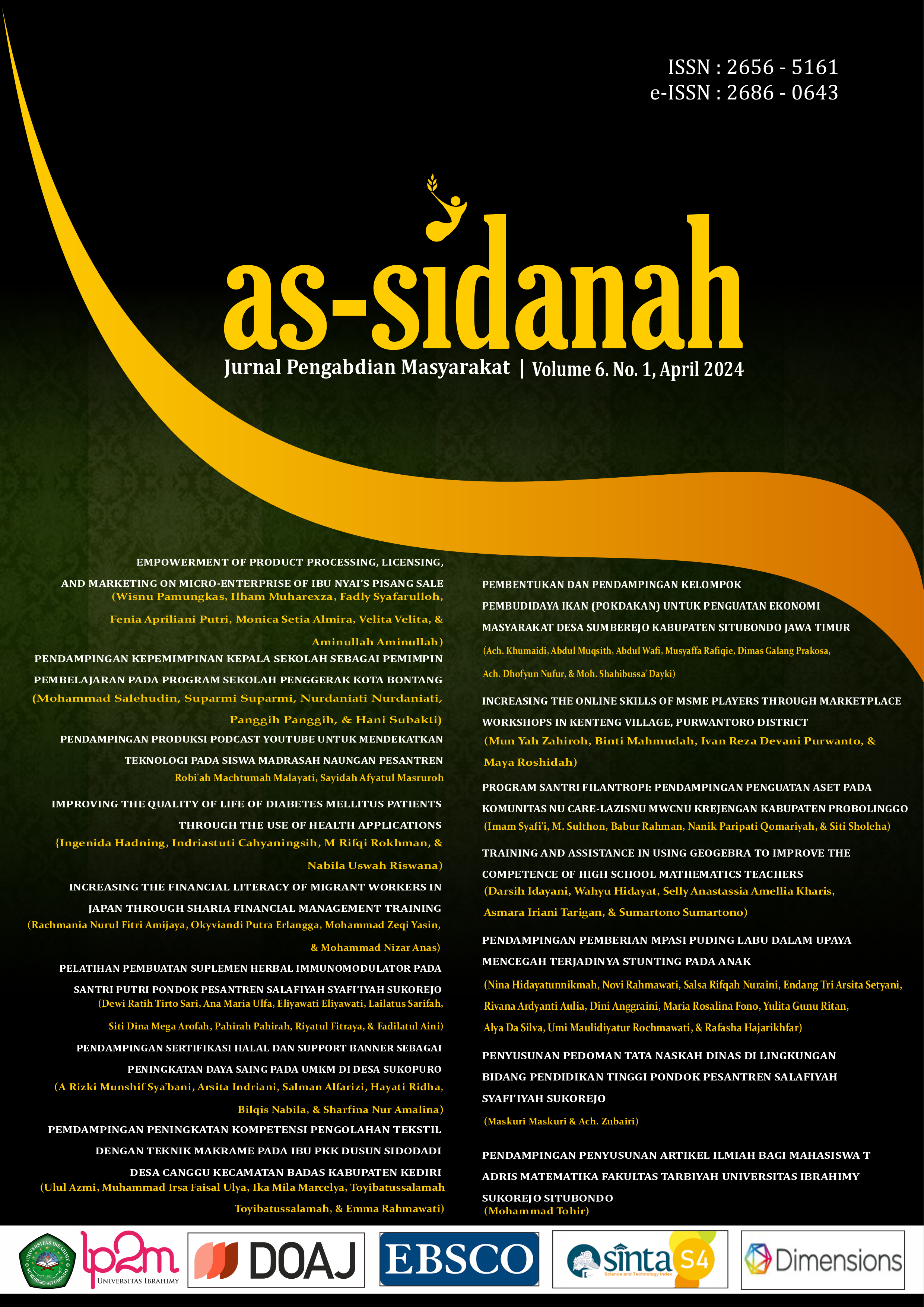IMPROVING THE QUALITY OF LIFE OF DIABETES MELLITUS PATIENTS THROUGH THE USE OF HEALTH APPLICATIONS
DOI:
https://doi.org/10.35316/assidanah.v6i1.60-71Keywords:
Diabetes Mellitus, Health Application, Quality of LifeAbstract
The use of health applications is proven to improve the knowledge and quality of life of diabetes mellitus patients. The information on the application is useful in preventing complications due to diabetes mellitus and improving therapy adherence. This community service aims to socialize the use of health applications and discover their effect on increasing knowledge about diabetes mellitus. The method used by this community service is Participatory Action Research (PAR). The partner in this activity is the Pharmaceutical Installation of PKU Muhammadiyah Hospital Bantul. The target of the activity is the elderly group assisted by PKU Muhammadiyah Bantul Hospital. Community service activities have been carried out on Saturday, May 29, 2023, at PKU Muhammadiyah Hospital Bantul. Activities were filled with the implementation of gymnastics, recitation, counselling materials about Diabetes Mellitus and socialization of the use of health applications to improve the quality of life of diabetes mellitus patients. Activities were evaluated through pretests and post-tests and testimonials from participants and activity partners. Participants' knowledge of diabetes mellitus and understanding of health applications also increased, as seen from their pre-test and post-test scores. It can be concluded that this community service activity can increase participants' knowledge of diabetes mellitus and understanding of the use of health applications.
Downloads
References
Androutsou, Thelma, Ioannis Kouris, Athanasios Anastasiou, Sotiris Pavlopoulos, Fariba Mostajeran, Doris Eva Bamiou, and others, 'A Smartphone Application Designed to Engage the Elderly in Home-Based Rehabilitation', Frontiers in Digital Health, 2 (2020), 15 <https://doi.org/10.3389/FDGTH.2020.00015>
Anis, Chintya, Sekplin A S Sekeon, Grace D Kandou, Fakultas Kesehatan, Masyarakat Universitas, and Sam Ratulangi, ‘Hubungan Antara Diabetes Melitus (Hiperglikemia) dengan Kualitas Hidup pada Lansia di Kelurahan Kolongan, Kecamatan Tomohon Tengah, Kota Tomohon’, Kesmas: Jurnal Kesehatan Masyarakat Universitas Sam Ratulangi, 6.3 (2017) <https://ejournal.unsrat.ac.id/v3/index.php/kesmas/article/view/22997> [accessed 19 March 2024]
Bonoto, Bráulio Cezar, Vânia Eloisa de Araújo, Isabella Piassi Godói, Lívia Lovato Pires de Lemos, Brian Godman, Marion Bennie, and others, 'Efficacy of Mobile Apps to Support the Care of Patients With Diabetes Mellitus: A Systematic Review and Meta-Analysis of Randomized Controlled Trials', JMIR MHealth and UHealth, 5.3 (2017) <https://doi.org/10.2196/MHEALTH.6309>
Damayantie, Netha, Muhammad Rusdi, Syamsurizal Syamsurizal, and Ummi Kalsum, ‘The Influence of Mobile App in Glycemic Control and Prevention of Hypoglycemics in Diabetic Management: A Systematic Review’, Nsc Nursing, 2.5 (2022), 84–109 <https://doi.org/10.32549/OPI-NSC-67>
Denzin, Norman K, and Yvonna S Lincoln, Handbook of Qualitative Research (Yogyakarta: Pustaka Pelajar, 2009)
Doupis, John, Georgios Festas, Christos Tsilivigos, Vasiliki Efthymiou, and Alexander Kokkinos, 'Smartphone-Based Technology in Diabetes Management', Diabetes Therapy : Research, Treatment and Education of Diabetes and Related Disorders, 11.3 (2020), 607–19 <https://doi.org/10.1007/S13300-020-00768-3>
Faridah, Ida, Yati Afiyanti, Ade Purnama, Stikes Yatsi Tangerang, and Fakultas Keperawatan, ‘Pengaruh Model Aplikasi Control Diabetes Mellitus Type 2 (CDMT2) Terhadap Kualitas Hidup Pada Pasien Diabetes Mellitus Tipe 2’, Interest : Jurnal Ilmu Kesehatan, 9.2 (2020), 220–25 <https://doi.org/10.37341/INTEREST.V9I2.241>
Hummel, Madeleine, Stephanie Erika Bonn, and Ylva Trolle Lagerros, 'The Effect of the Smartphone App DiaCert on Health-Related Quality of Life in Patients with Type 2 Diabetes: Results from a Randomized Controlled Trial', Diabetology & Metabolic Syndrome, 14.1 (2022) <https://doi.org/10.1186/S13098-022-00965-Z>
Kementerian Kesehatan RI, Hasil Riset Kesehatan Dasar (Riskesdas) 2018, Jakarta: Balitbang Kemenkes RI (Jakarta: Badan Penelitian dan Pengembangan Kesehatan Kementerian Kesehatan RI, 2018) <https://kesmas.kemkes.go.id/assets/upload/dir_519d41d8cd98f00/files/Hasil-riskesdas-2018_1274.pdf> [accessed 18 March 2024]
———, Infodatin Tetap Produktif, Cegah, Dan Atasi Diabetes Melitus 2020 (Pusat Data Dan Informasi Kementerian Kesehatan RI, 2020)
Kemetrian Kesehatan RI, Diabetes Fakta Dan Angka, 2016 [accessed 18 March 2024]
Keperawatan dan Kebidanan Aisyiyah, Jurnal, Nur Isnaini, and Universitas Muhammadiyah Purwokerto Jawa Tengah Indonesia, ‘Faktor Risiko Mempengaruhi Kejadian Diabetes Mellitus Tipe Dua’, Jurnal Kebidanan Dan Keperawatan Aisyiyah, 14.1 (2018), 59–68 <https://doi.org/10.31101/JKK.550>
LaManna, Jacqueline, Michelle L. Litchman, Jane K. Dickinson, Andrew Todd, Mary M. Julius, Christina R. Whitehouse, and others, 'Diabetes Education Impact on Hypoglycemia Outcomes: A Systematic Review of Evidence and Gaps in the Literature', The Diabetes Educator, 45.4 (2019), 349–69 <https://doi.org/10.1177/0145721719855931>
Munawar-Rachman, Budhy, Islam Pluralis: Wacana Kesetaraan Kaum Beriman (Jakarta: Paramadina, 2001) /catalog.umj.ac.id%2Findex.php%3Fp%3Dshow_detail%26id%3D65042%26keywords%3D> [accessed March 19 2024]
Nazar, Chaudhary Muhammad Junaid, Micheal Mauton Bojerenu, Muhammad Safdar, and Jibran Marwat, 'Effectiveness of Diabetes Education and Awareness of Diabetes Mellitus in Combating Diabetes in the United Kingdom; a Literature Review', Journal of Nephropharmacology, 5.2 (2016), 110 [accessed March 19 2024]
Paiva, Joseane O.V., Rossana M.C. Andrade, Pedro Almir M. de Oliveira, Paulo Duarte, Ismayle S. Santos, Aline L.P. de Evangelista, and others, ‘Mobile Applications for Elderly Healthcare: A Systematic Mapping’, PloS One, 15.7 (2020) <https://doi.org/10.1371/JOURNAL.PONE.0236091>
Permatasari, Ayu Diah, Trihandini Indang, Ryza Jazid Baharuddin Nur, and Rico Kurniawan, ‘Manfaat Penggunaan Mobile Health (m-Health) dalam Pencatatan dan Pelaporan Kesehatan Ibu’, Jurnal Biostatistik, Kependudukan, Dan Informatika Kesehatan, 1.2 (2021), 100–112 <https://doi.org/10.51181/BIKFOKES.V1I2.4810>
Saeedi, Pouya, Inga Petersohn, Paraskevi Salpea, Belma Malanda, Suvi Karuranga, Nigel Unwin, and others, 'Global and Regional Diabetes Prevalence Estimates for 2019 and Projections for 2030 and 2045: Results from the International Diabetes Federation Diabetes Atlas, 9th Edition', Diabetes Research and Clinical Practice, 157 (2019) <https://doi.org/10.1016/J.DIABRES.2019.107843>
Stevens, Sebastian, Susan Gallagher, Tim Andrews, Liz Ashall-Payne, Lloyd Humphreys, and Simon Leigh, 'The Effectiveness of Digital Health Technologies for Patients with Diabetes Mellitus: A Systematic Review', Frontiers in Clinical Diabetes and Healthcare, 3 (2022) <https://doi.org/10.3389/FCDHC.2022.936752>
Tomic, Dunya, Jonathan E. Shaw, and Dianna J. Magliano, 'The Burden and Risks of Emerging Complications of Diabetes Mellitus', Nature Reviews. Endocrinology, 18.9 (2022), 525–39 <https://doi.org/10.1038/S41574-022-00690-7>
World Health Organization, Global Report on Diabetes (Geneva, Switzerland: WHO Press, 2016) <https://www.google.com/search?client=opera&q=Laporan+WHO+2016+tentang+diabetus+melitus&sourceid=opera&ie=UTF-8&oe=UTF-8.> [accessed January 10 2024]
———, MHealth: New Horizons for Health through Mobile Technologies: Second Global Survey on EHealth (Russian: Institutional Repository for Information Sharing, 2011), 3RD ED <https://www.afro.who.int/publications/mhealth-new-horizons-health-through-mobile-technologie> [accessed March 1 2024]
Downloads
Published
How to Cite
Issue
Section
License






















